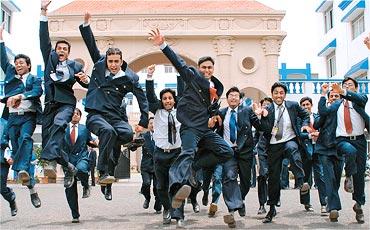 | « Back to article | Print this article |
MBA at IIMs: The truth about placement figures
The fourth of an eight-part series on one-year full-time MBA at IIMs looks at the salaries the graduates command.
Part I: How the one-year MBA is different from an Exec MBA
Part II: MBA at IIMs: An alumnus spills the beans
Part III: Rigour of a global 2-year MBA in one year
Top salaries are reaching a new high and landing on the laps of one-year full-time MBA graduates.
Let's consider the salary statistics for IIM-Indore's one-year full-time MBA class of 2011, which requires students to have a minimum five years' work experience.
Cost to company (CTC) figures in 2011 EPGP and PGP placement reports tell a compelling story.
The mean domestic salary for those graduating the one-year full-time MBA (EPGP) is Rs 17.75 lakh, and for those of the two-year full-time course (PGP) is Rs 14.06 lakh. The full placement report for EPGP can be read at (http://bit.ly/plepgp).
The contrast in salaries is starker at IIM-Ahmedabad, where the minimum work experience required is closer to seven years. An all-time high international salary of Rs 1.35 crore was offered to a one-year full-time MBA (PGPX) graduate in 2007.
The detailed 2011 PGPX and PGP placement report for IIM-A shows the following CTC figures for graduates of one-year full-time MBA and two-year PGP:
- One-year full-time MBA (PGPX) mean domestic salary is Rs 27,13,974
- Two-year full-time programme (PGP) mean domestic salary is Rs 16,36,346
- One-year full-time MBA (PGPX) minimum domestic salary is Rs 18,40,000
- Two-year full-time programme (PGP) minimum domestic salary Rs 8,00,000
- One-year full-time MBA (PGPX) maximum domestic salary is Rs 42,02,997
- Two-year full-time programme (PGP) maximum domestic salary is Rs 37,00,000
In 2011, the average salary received by the one-year batch at IIM-Calcutta was Rs 19.66 lakh, and Rs 20 lakh at IIM-Bangalore.
The placement of the one-year full-time MBA graduates at IIMs is better than that of those graduating other one-year full-time MBAs in India. Indian School of Business, which popularised the one-year format, quotes an average CTC of Rs 17,92,000 for its 2011 batch.
Companies recruiting from the one-year full-time MBA at IIMs include all the prestigious firms that recruit from the two-year course.
JP Morgan, Goldman Sachs, KPMG, McKinsey & Co, Booz Allen Hamilton, Deloitte, GE, Ernst & Young, Arcelor Mittal, General Motors, HSBC, IBM, Oracle, Microsoft, Unilever, Google and Ericsson pick up talent.
The placement process of the two courses is different. While the two-year course has a 'placement week' and talks about 'day zero placements', the one-year course follows a rolling model, as is the practice at most global schools.
This means recruiters visit the campus through the year. This is because the candidates of the one-year course are hired for leadership roles, not entry level ones, and this requires a different approach to hiring.
Here, interactions between candidates and recruiters happen over a longer period, with recruiters engaging closely with the candidate they would like to hire.
Placements for both the two-year course and the one-year full-time MBA are student driven.
The institutes provide no more or no less help to the one-year candidates than they provide to the two-year ones.
I would like to add that at times, one or two candidates from both the courses do not get the kind of role s they are looking for.
In the context of a student of the one-year course, this can happen when a candidate is looking for a drastic career change for example, from information technology (IT) to finance, after seven-eight years of experience in IT.
This kind of transition is difficult, not because of any shortcoming in the one-year course but because after this quantum of experience in a specific area, the recruiter can neither place the candidate at a senior level in a new role nor at a trainee level in a fresh role.
A candidate in such a situation might chose to rejoin his previous employer in a higher role.
Building managerial skills on the basis of experience is the goal of an MBA, and I found the one-year full-time MBA at IIMs delivered well on that promise.
I advise students to change their approach while judging the worth of an MBA course -- from a single-minded focus on placements to the ability of the course to transform them into leaders.
You would be surprised to know no international b-school promises placements. This is primarily because their class profile, similar to the class profile of the one-year full-time MBA at IIMs, consists of candidates suited for highly specific roles, that are sometimes not available.
It might come as an eye opener for many that at Harvard, considering data from 2007-2012, on an average, 20 per cent of the MBA class was not placed at the end of the course and 10 per cent was not placed even three months after graduation.
Does that change the standard of MBA at Harvard? Not at all!
The writer is a globally awarded brand management and advertising professional and former head-brand, HCL Infosystems. He can be reached at e09shikharm@alumni.iimidr.ac.in.
To know more about the one-year full time MBA at IIM Indore pursued by the writer, visit fb.com/IIMIEPGP

